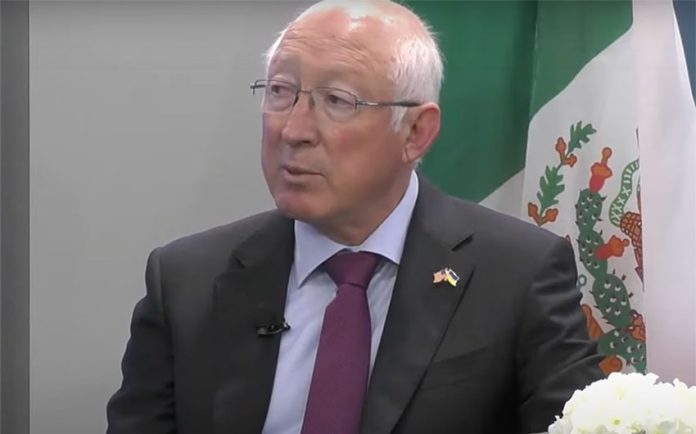United States Ambassador Ken Salazar has acknowledged that U.S. energy companies are having problems securing the permits they need to operate without encumbrance in Mexico.
He addressed the issue while speaking about the federal government’s proposed electricity reform – which would guarantee 54% of the market to the state-owned Federal Electricity Commission (CFE) – during an Atlantic Council discussion in which Mexico’s ambassador to the United States, Esteban Moctezuma, also participated.
“My role as ambassador is to represent the United States and to carry out President Biden’s wishes. The way we view the energy, electricity reform challenges is we have to resolve … [them] in a way that supports the vision of the United States of America and that’s to create a clean energy powerhouse [in North America],” Salazar said.
“That’s part of the series of conversations we’ve had,” the ambassador said, noting that he, United States Special Presidential Envoy for Climate John Kerry and U.S. Energy Secretary Jennifer Granholm have all met with President López Obrador.
“We have all expressed our real concerns. In the State Department world they call these things inquietudes [concerns], I call them temblores, little earthquakes, but we still have the building together. We need to work through some really tough issues, one of them has to do with contracts and permits. We’re pushing resolution of those things, hopefully there will be some resolution of that because otherwise you can’t have confidence in investment in Mexico,” Salazar said.
More than 600 energy sector permit applications submitted to the Energy Regulatory Commission, the Energy Ministry and the Agency for Safety, Energy and the Environment are stalled, according to Beatriz Marcelino Estrada, president of the Association of Energy Distributors and Dealers. The delays are affecting investments worth approximately 18 billion pesos (US $883 million), she said.
The newspaper Reforma reported last month that gasoline retailers and other private companies are effectively being forced to purchase fuel from the state oil company Pemex because the federal government isn’t renewing import permits and has shut down some privately owned fuel storage terminals. It said that there were just 88 valid fuel import permits as of February 1, whereas there were over 1,000 in December 2018.
Continuing his commentary on the proposed electricity reform, which will face a vote in the Congress some time later this year, Salazar acknowledged that “Mexico has its own sovereignty” and “will pass … legislation of some kind.”
“But at the end of the day our concern is that it support the integration of the supply chain between the United States and Mexico. Everywhere I go – I’ve been to some 20 states in Mexico – I see how our economies are already so integrated,” he said.
For his part, Ambassador Moctezuma noted that energy sector stakeholders had discussed the proposed constitutional reform in an “open parliament” process.
“Many companies have been very vocal and active telling [us] what they think about the initiative. In Mexico we need a strong public electricity enterprise because it’s responsible for all the grid. All the grid is supported by CFE,” he said.
“… Whatever comes from the initiative I think that it’s going to be for the … [betterment] and the efficiency of the system as a whole,” Moctezuma said.
“And one thing that also is the backbone of President López Obrador’s view about not just electricity but any public activity is to really get rid of corruption and that’s part of the initiative, to really make a transparent system,” he said.
Moctezuma also said that the Mexican government is in “permanent dialogue with specific companies” to understand their needs and reaction to the bill.
“I believe the outcome will be something that will guarantee what the president needs to strengthen the CFE and also [guarantee] an open, transparent and efficient market,” the ambassador said.
Salazar and Moctezuma also discussed a range of other bilateral issues, including migration and security, in a 45-minute discussion with Jason Marczak, director of the Adrienne Arsht Latin America Center at the Atlantic Council, a Washington D.C.-based think tank.
Meanwhile, two bank chiefs who spoke with the newspaper El Financiero said that a lack of certainty in the energy sector is affecting investment.
“We expected that a very significant part of investment in Mexico would go to this sector but as this isn’t materializing we’re seeing a significant burden on the economic potential of Mexico,” said Jorge Arce, CEO of HSBC México.
“… They have to clarify the rules about how and when people can invest in this sector,” he said.
Noting that energy sector activity is crucial for economic growth, Scotiabank México chief Adrián Otero also called for clarity.
“We’re confident there will be dialogue … and we know that the impacts [of the proposed reform] will be analyzed,” he added.
With reports from El Economista and El Financiero
